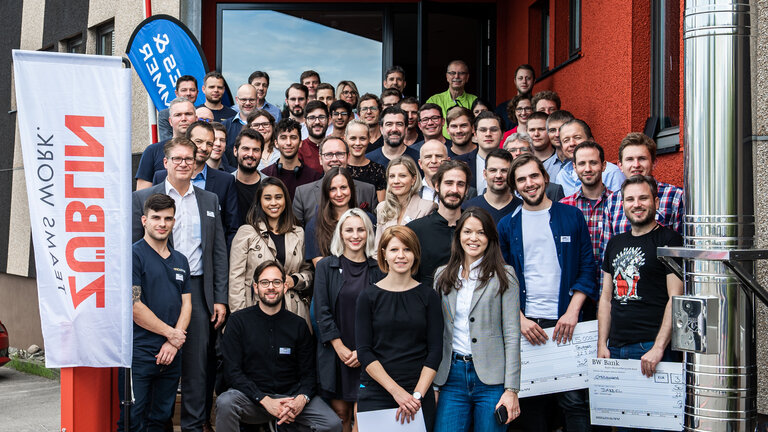During the first hackathon of Drees & Sommer's Creators Platform – startups such as Leaftech, Aedifion, Dabbel, Propster, WeAre, Cozyo and Noah – and students from EBZ Business School Bochum and Ruhr West University of Applied Sciences worked together for a weekend on prototypes and concepts. The event took place as part of theThemenreise event, an interdisciplinary exchange of ideas regarding the future design of towns and cities, locations and companies from the industrial, automotive and logistics sectors. The hackathon focused on the user experience and emotional buildings. By using artificial intelligence, emotional buildings react to user behavior and improve the feel-good factor. The participants showed the newly developed solutions to the jury in a final presentation. For Phoenix Contact, the focus was on smart building control based on user feedback; for Ed. Züblin AG it was emotional communication during planning along with the project stakeholders; while Drees & Sommer focused on the user experience in the buildings of the future.
When Your Personal Comfort Assistant Knows Exactly What You Need
‘A hackathon is a perfect tool for accelerating an innovation process. Creative startup companies and students together proved how successfully this can work during this weekend,’ explained Nathanie Ursinus-Vasiliadis, Digital Business Manager and expert for startups at Drees & Sommer. Relaxed, full of energy or under stress? The Hestia app developed by Leaftech is a personal comfort assistant that ensures the right air-con, lighting and sound conditions, depending on mood and the need for comfort. The startup team took first place with this personal assistant. Dabbel secured second place with the idea of recording emotions. To do so, the participants developed a synthetic approach to represent the pulse and electrodermal activity. They studied how temperature and lighting reduce stress and trained a model to maximize well-being through adaptable buildings.
WeAre developed the prototype for a virtual reality collaboration solution, which was awarded third place. The aim is to enable users to analyze and discuss trades-related construction data by means of 3D views, regardless of time and place. Videos, photos, whiteboards or notes created during the virtual conference can be shared with other users, quickly and easily. An impromptu team of students from the EBZ Business School and Ruhr West University of Applied Sciences also developed new solutions for Drees & Sommer. The jury found their idea of linking building users with suitable rooms so fascinating that the team received a special award.
Hackathon as a springboard for ideas
At the beginning, Jörg-Peter Schultheis, one of the jurors and investor of the smart city project Spring Park Valley near Frankfurt am Main, gave a major stimulus to the participants through his lecture entitled Spring Park Valley: Emotion beats technology. A total of EUR 10,000 in prize money was allocated for the first three places. The winners' ideas will also be included in the Spring Park Valley project, and they will receive further support, such as the opportunity to present their ideas at conferences and congresses. The jury consisted of seven experts of the real estate and innovation sectors: Dr. Teresa Valerie Mandl, Chief Executive Officer of T.V.T Swissconsult;
Jörg-Peter Schultheis, investor of Spring Park Valley; Lothar Kuhn, Deputy Editor-in-Chief of Edison Media; Dr. Ulrich Klotz, Management Board Member at Ed. Züblin; Bernhard Tillmanns, Head of Global Industry Management Building Technology at Phoenix Contact; Professor
Dr.-Ing. Viktor Grinewitschus, Endowed Chair for Energy Management in the Real Estate Industry at EBZ Business School, sponsored by energy service provider Techem; and Patrick Theis, Partner and Innovation Center Managing Director at Drees & Sommer. Assessment criteria in the areas of ‘problem solving and implementation’ and ‘added value’ included focusing on the task, progress during the weekend, user-centricity and innovation potential.
